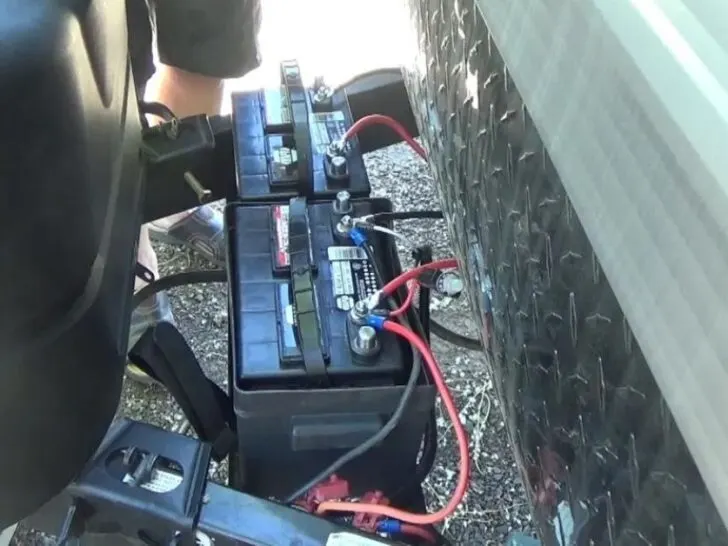Pop-Up campers contain lithium ion and lead acid batteries to run the electric components. These are beneficial to run 12-volt electrical appliances. Many people maintain them properly to increase their average life span and decrease the replacement costs.
How Long Does a Pop-Up Camper Battery Last? Pop-Up camper batteries can last for 6-8 years with regular maintenance. In addition, a 12 Volt battery can hold the charge for a maximum of 8 days. However, the battery’s longevity depends on the battery’s size, number of accessories, temperature conditions, type and quality of the battery, maintenance schedule, capacity of the battery, and usage frequency.
You should check the batteries while selecting the camper for your trip. In addition, you can also face issues if your battery keeps dying and you cannot find a nearby charging spot.
How long will the pop-up camper battery last?
Pop-up campers contain deep-cycle batteries that are usually lead acid or lithium-ion. These have an average life span of 6 to 8 years with proper maintenance and storage conditions.
In addition, these also have an average life span of more than 8 years. However, many people complain that they have to replace them after 3 to 4 years.
The average life span decreases because of incorrect usage and poor maintenance. A properly charged 12-volt battery can hold the charge for about 2 to 8 days, depending on several conditions.
You can spend several days and nights without charging them. Moreover, you can optimize their life by conserving their power. I always prefer to use low-power devices and minimize the use of high-current drawing appliances when campers are running on batteries.
Check the water level and recharge properly by connecting with shore power on campsites.
What factors affect the life span of a Pop-up camper battery?
The life span of pop-up camper batteries depends on several factors. These factors are helpful to increase and decrease their longevity. These are reliable power sources for your campers when external electricity is not available in your surrounding location.
Size and capacity of the battery
The average life span of batteries varies according to their standard size and capacity. The size and capacity determine the energy that they can store.
The larger ones with more capacity store excessive energy and can last longer. These can hold the charge for a longer time and can run for more than 6 days.
These can hold a charge for more time when you conserve the power and carefully use the electric appliances. You do not have to recharge them frequently, decreasing their life and increasing their failure risk.
Frequent charging on different campsites decreases the life of batteries. It is better to install the larger ones with more capacity so you do not have to recharge them frequently.
Number of accessories
Pop-up campers are smaller in size, but these contain a lot of accessories for the comfort of people. In addition, people also install different electrical components in them to make their journey comfortable.
These electric appliances draw power from the electric source in your RV. Many people connect them with a direct power source, while others prefer to use batteries.
These batteries can last for more than 7 to 8 years, depending on the number of electric appliances you use. The average life of these power sources decreases when you use high-current drawing appliances like refrigerators, microwaves, and electric heaters.
You can increase their longevity by conserving the power and using these high-current drawing devices on propane gas.
Temperature conditions
Temperature conditions also decrease the life span of the pop-up camper batteries. The issue usually comes when you frequently travel in areas where the temperature is relatively high.
Hot temperature in the surrounding environment increases the risk of their failure.
Faster chemical reaction increases water loss and causes electrolyte imbalance. In addition, excessive water loss can lead to corrosion, and these cannot hold the charge properly.
Hot temperature also triggers the self-discharging process, contributing to the deterioration of these power sources.
High temperatures can also cause damage or warping of their internal components, including plates, and they cannot hold the charge for a longer time.
Type and quality of the battery
Most often, these campers contain deep-cycle batteries because you can recharge them. These are basically of two types, including lithium ions and lead acid.
Many people prefer lead-acid ones because they are affordable. However, these are heavier and need more maintenance. Moreover, lithium-ion batteries are newer, and they are lighter in weight.
Lithium-ion batteries can also last for longer because of their higher reliability. These have a longer life span because of the slower rate of charge loss and high-power density levels.
Maintenance schedule
Scheduled maintenance can significantly affect the life of the pop-up camper batteries. It is necessary to clean them properly and remove the corrosion from their terminals using dielectric greasers.
Accumulation of dust and corrosion on their terminals decreases their longevity because these cannot hold the charge properly. In addition, it is also necessary to charge them properly and avoid over and undercharging because it can kill these components.
I always prefer to periodically check their electrolyte levels because these can lead to the deterioration of their internal components.
Add the distilled water by removing their caps instead of tape water because of their higher mineral content.
Usage frequency
Your pop-up campers’ usage frequency significantly impacts their battery’s longevity. These cannot last long when the frequency of power usage is higher.
They need frequent recharging when you run refrigerators, electric heaters, and microwave ovens on them. In addition, usage frequency also increases when people heavily rely on batteries and camp in off-grid areas.
One of my friends told me they had to rely completely on battery power because of the absence of shore power in their camping location.
How do I keep my Pop-Up camper battery charged?
It is necessary to maintain the charge of the camper batteries. Charge maintenance is helpful to increase their longevity and decrease the risk of overtime deterioration.
These can also last for longer when you maintain their charge correctly. You can keep them charged by disconnecting them from your campers.
It is better to disconnect them when these are not in use and you are storing your RVs. Several components in your campers consistently draw power from the batteries when these are off.
Disconnecting them while storing them is the best option to keep them charged and increase their life span.
How often do you need to replace the battery in a camper?
Replacing your pop-up camper battery after 5 to 6 years is recommended. In addition, replacement time also varies depending on several factors.
Many people do not disconnect them while storing them, which can lead to their deterioration, and you have to replace them more frequently.
These become dead when electric components draw electricity from them. The battery needs replacement when not holding a charge and requires frequent recharging.
It is best to install the new ones when you see any physical damages and leakages. Visible signs of damage include bulging, cracking, leaking of electrolytes, and corrosion on their sides.
How do I know if my camper battery is bad?
It is necessary to check your pop-up camper batteries frequently so you can change them when they are becoming bad. It is better to check their voltage, which usually depicts their working efficiency and charge-holding ability.
You can use the voltmeter or multimeter to check their voltage. Voltage below the marked level shows that you have to replace them with new ones, and these are going to die.
Check their temperature using the necessary tools; too high or too low temperatures are the significant signs of faulty batteries needing replacement.
Related Articles:

